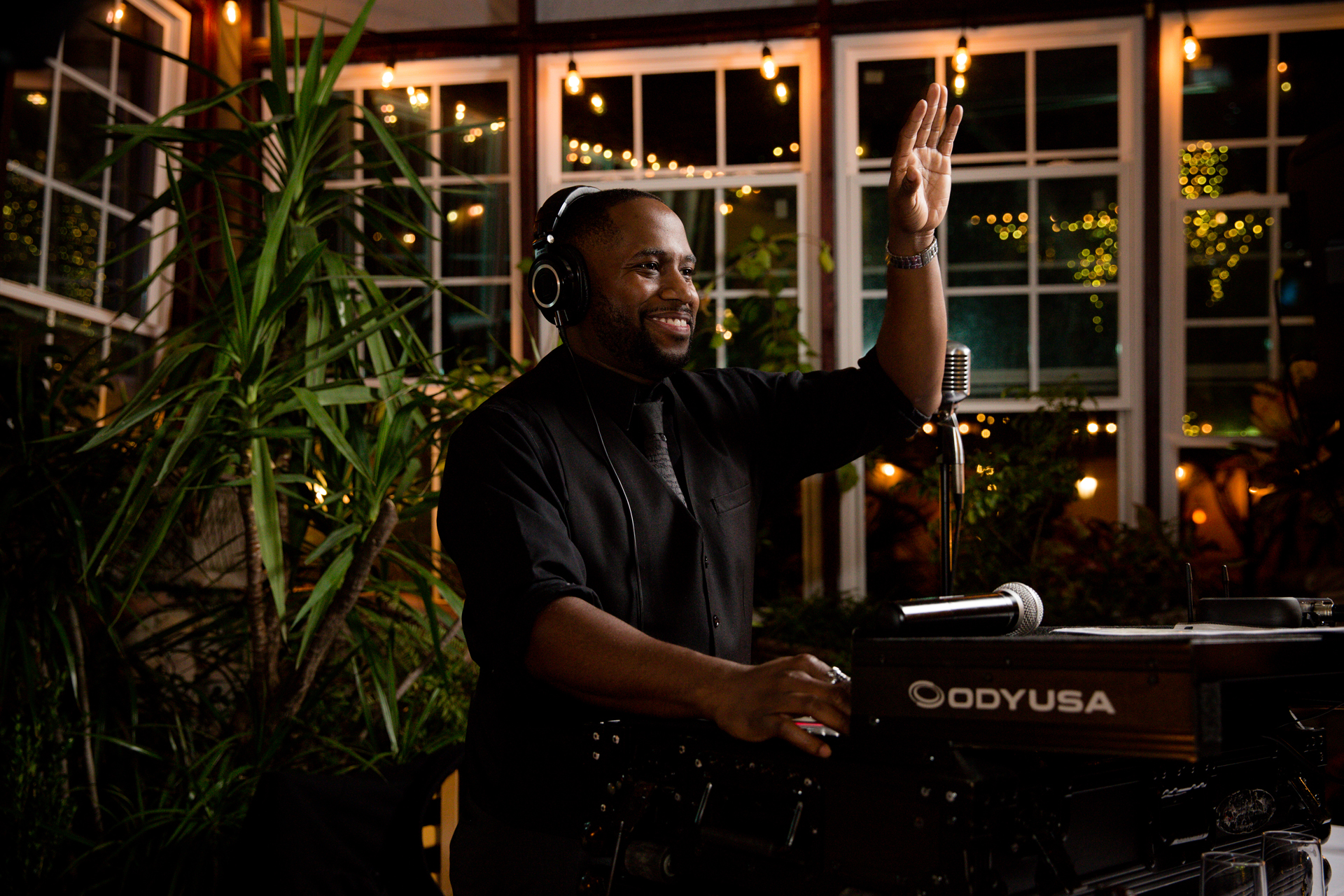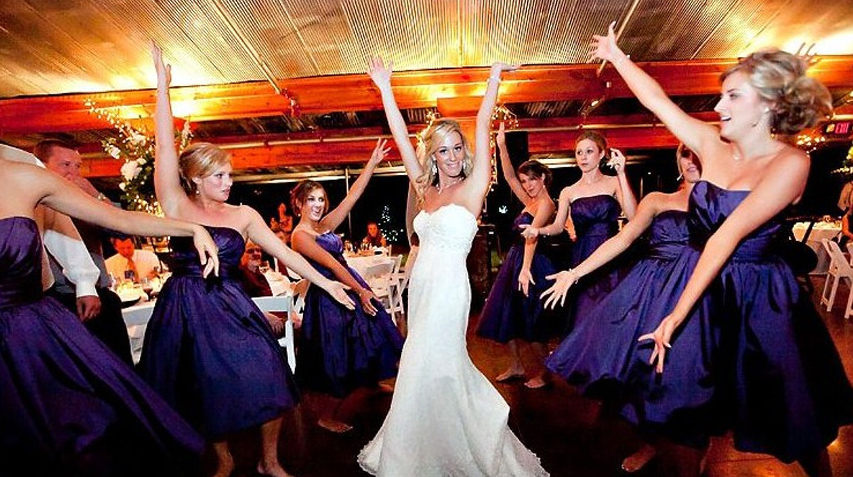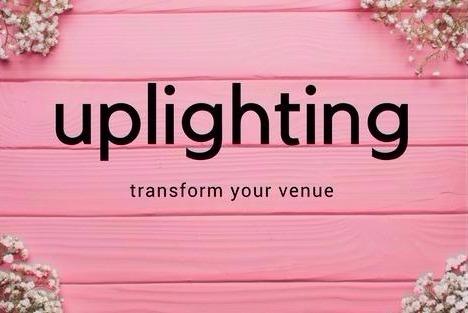What is a Mobile DJ?
September 21, 2020

When you’re planning a wedding, you have or are probably thinking about hiring a wedding DJ, and after looking into it, you have probably found different terms for different types of DJs. Of course, there are DJs for birthday parties; both kids and adults. There are DJs for bachelor and bachelorette parties. There are DJs provided by the wedding venues you’ve seen. In fact, the venues that offer this service, probably do so at an additional cost even when you use their space, and they are usually overpriced for the services they provide. And since their primary job is mostly just to “play music”, you lose out on a lot of really great additional amenities that a traditional or mobile DJ can provide to you.
So what is a mobile DJ? How are they any different from any other DJ? Let’s go over that for you and then discuss the differences between a “traditional” DJ and a mobile DJ so that you can make the best decision for your budget and your event. (You know, let us get to the point.)
A mobile DJ is a DJ (or disc jockey) that has a set of specialized equipment that they personally own for use during their business. These DJs are able to move from place to place, bringing their specialized equipment with them, to be sure that you get the best available “bang for your buck”. They don’t have to rent the equipment from anyone and so they always have what they need available to them. Obviously, because of these reasons, they are dubbed “mobile”, because they can come to you and bring their equipment with them instead of relying on what is “available” from the venue. They don’t require a special location or an additional fee because you chose one space over another. Many have been in an area so many times, in fact, that they get familiar with the venues in their location and can even help you pick a good place for them to set up or give advice on where there should be a dance floor, etc.
Also, a mobile DJ also owns a set playlist of music (called a song library) that they have acquired over their career or from various subscriptions so there is a wide variety of popular songs and dances that they can bring with them to your party or wedding. This song library can differ from DJ to DJ, and if you are looking at the DJ provided by the venue, it’s quite possible they will not have as large of a selection as a mobile DJ that entertains at parties and ceremonies as part of their own or their company’s business, regularly. These DJs have had to collect the rights and correct licensing in order to play the songs, and many venue DJs may not have gone through that process because of the time and money that is involved for subscriptions or other music services available to them.
DJ Equipment and Songs
Getting access to these popular songs and dances (legally, of course) can be done a few ways. One way is a record pool. These pools are a subscription-based service that a DJ would pay for on a monthly basis and in return, they have access to tons of new music at their fingertips.
Another way is to simply create playlists, like everyone else. DJs can pay for services like Spotify and create different playlists for different events, even going so far as to customize a playlist for each individual event, then play that music during their next gig. Of course, there are many other ways that a DJ can get legal music, but these are by far some of the easiest and fastest.
Now, while each DJ is different and their needs may differ depending on the types of events they host, there are also types of equipment that every DJ either has to have or would like to have. Here’s a list of typical equipment a mobile DJ might own and how much each piece costs so you have an idea:
- A player — this can be a laptop computer or a full-on rig with turntables and a mixer, or really whatever the DJ likes and wants to use. Some DJs use iPods, others have had experience with other media players and prefer those. The choice is really up to the DJ. These items can cost anywhere from a few hundred dollars up to or exceeding a few thousand, depending on the DJ’s choice.
- Song Storage — A mobile DJ can’t get away with just a few good songs, they have to have the most entertaining, most requested titles. So a massive song library is a must-have. Because of this, mobile DJs need pretty big, totally reliable hard drives and backup drives. These kinds of devices don’t cost that much anymore but can still cost a pretty penny for a good device. $50 - $200.
- Internet -- A portable internet hotspot is pretty invaluable to the mobile DJ so they can download or even stream songs as guests’ requests start coming in. Of course, a portable internet solution can vary from carrier to carrier, but $20 a month to $70 a month is a fair assessment of this service for most DJs, plus the cost of the device.
- PA system — Almost every case where a mobile DJ is hired, they must bring the PA. A pretty standard system includes two 15″ powered speakers mounted on top of powered subwoofers using a pole, plus microphones (and there are different types of microphones; handhelds, lapels..). This gives the DJ a quick set up and a lot of range for their sound with a pretty small footprint and less weight. This kind of equipment can cost anywhere from a few hundred and up to quite a few thousand.
- Lighting — Some DJs have lighting setups and we’re not just talking about a disco ball, laser show, or strobe lights. These lights are specifically for creating an ambiance for the whole room or party and they can cost a pretty penny for a good set. It really depends on what the DJ decides they need because each piece can cost anywhere from ~$50 to hundreds of dollars. When the DJ owns more than a few, the cost can really add up.
- Cases — A really good professional DJ has cases to carry all of their gear, so it doesn’t get beat up during transport to the different venues they visit. These can be anything from “soft-sided” duffle type bags to hard-sided cases (a much better option). Depending on the size of their setup, they may choose to have just a few cases or a case for every item. At $200 and even up to $800 a pop, these cases can get quite pricey.
- Cables — Cables are everything. And if/when a mobile DJ is doing an event on a night or weekends (or worse, a weekend night!), there’s simply no good way to pick up a set of emergency cables at the store if something goes awry or they find they don’t have a cable they need. So like anyone in any profession, they must be prepared with an “emergency kit” of cables, aside from the cables they know they always use. While cables aren’t that expensive (most of the time), having a lot of them can add up.
- Software – No one really talks about it, much, (except us DJs, of course) but really great software is a must-have in our industry. Of course, you can get away with cheap stuff, but for a really great setup, having good software that can help you sync all of your equipment and play your songs (and maybe even hook up to a streaming service, too) is key. Unfortunately, really great software costs a lot of money, like $1,200 and even more. Even the cheaper software costs $500 and up. So now you might know why those venues pass these kinds of charges onto their customers! This stuff can get expensive.
So as you can see, this is why renting the equipment from a venue (or anywhere) can get very expensive, rather than using a DJ that already owns it. Those fees you get charged by the venue are their attempts at trying to recover the thousands of dollars they invested in the equipment. Luckily, with a mobile DJ, they’ve worked all of this into their regular fees, so you don’t have to worry about any additional surprises for equipment.
What is the Difference Between a “DJ” and a Mobile DJ?
A traditional DJ is better known for being available at a specific location, although this is not always true. The modern DJ evolved from the traditional radio disc jockeys in the 30’s and beyond. They were tasked with entertaining people by playing popular dance music and “keeping the party going”, and when they moved from radio into what we now consider “clubs” or dance halls, they changed history and became what we know now as just a “DJ”. DJs play the music and keep the crowd excited and pumped up. It’s their job to make sure everyone is having a good time, much like it was back in the days where radio was the only way for people to hear music before record players were more available and affordable to the public.
However, in the beginning, traditional DJs were located inside of one bar or one club and they didn’t move around to other clubs or discos. They were the venue’s entertainment, and some venues still have DJs they employ and keep in-house for their own parties and events. This is the major difference between the two, now. A mobile DJ goes from place to place, and sometimes, depending on their popularity, a venue, like a popular nightclub may request a DJ come to their venue and “spin” for a special one-time event.
In these last few decades, we can see this trend becoming more and more popular with DJs such as Avicii (RIP, 2018) and Marshmello. DJs of this caliber, however, get invited, more often especially now, to collaborate with other musical artists, which doesn’t happen for the majority of traditional DJs. Many start out “in the party scene”, DJing for birthdays, high school reunions and the like before they learn their craft well enough to move on to other refined events, such as a wedding.
Why a Mobile DJ is Better
When you’re looking for help with music at your wedding or other kind of event, a mobile DJ is probably your first thought and best choice. There aren’t that many high schools or event spaces that use their own DJ or even provide their own equipment, so they will pay a DJ to come in (and then they will have to pay the cost for the equipment rental and more, so they end up passing those fees on to you).
A good mobile DJ is also more than “just a DJ”. They don’t “just show up”, do their jobs, and leave. They are available to help you plan your event schedule and make sure that your party or ceremony goes off without a hitch. Professional wedding DJs can advise you on music selections, dance floor location, and more, even going so far as to double as an MC (or Master of Ceremonies) at your party to help people on track during different parts of the event (that’s what we do!). These professionals are at your disposal, not the venue’s, so you have the final say on most decisions and you won’t have to pay extra, which is the biggest and best reason to consider them! Who wants someone telling them how to run their wedding or birthday party? We know many brides who would be mighty upset at that!
If you’re ready to select a mobile DJ to help “get the party started” or just help keep everything running smoothly during your wedding, let us know! We would love to help you create the event of your dreams! Get a quote today!






